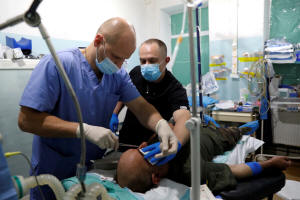Near Ukraine's southern frontline, medics brave rockets to treat
soldiers
 Send a link to a friend
Send a link to a friend
 [May 18, 2023]
By Max Hunder [May 18, 2023]
By Max Hunder
ZAPORIZHZHIA REGION, Ukraine (Reuters) - As the doctor prepared to
administer an injection, the loud thud of an artillery shell in the
distance broke the silence in the operating room.
The staff at this emergency medical treatment point for soldiers near
the Zaporizhzhia frontline in Ukraine's south, aren't fazed by the
danger.
"We don't have time to think things over or have doubts, we don't have
time to worry, because this is our job and we have to do it," said
Denys, a 35-year-old surgeon who had just finished stitching up a
soldier's head wound as the blasts thudded.
There have been near misses. In March, a Russian rocket landed 10 metres
from the old, single-storeyed building's entrance, showering shards of
glass and chunks of brick onto rudimentary operating tables. Less than
two weeks ago, another rocket flattened a chunk of a nearby schoolhouse.
Denys, who like most other staff would give only a first name, runs the
centre, known as a stabilisation point. Similar stations are found
within easy reach of all Ukrainian frontlines.
The job of the medics here is to perform emergency first aid on
casualties so they survive the journey to hospitals further from the
fighting - a task expected to become even more vital when Ukraine
launches its long-awaited counteroffensive.

Ukraine has shrouded figures about its wartime casualties in secrecy.
The doctors would not say how many they treat or whether the number has
changed over time.
The biggest danger to Ukrainian soldiers, like the shaven-headed
serviceman with flecks of blood glistening on his forehead where Denys
had stitched up his head wound, is from Russia's artillery.
The soldier, who had been thrown to the ground by the blast wave from a
shell, would now be sent to a hospital to be examined for possible brain
injury.
[to top of second column]
|

Surgeon Denys and a nurse treat a
wounded Ukrainian soldier in the emergency room of an emergency
treatment point near the frontline, amid Russia's attack on Ukraine,
in Zaporizhzhia region, Ukraine, May 17, 2023. REUTERS/Bernadett
Szabo

Ihor, a doctor with 15 years of experience as an army medic, said
artillery accounted for about 90% of injuries he had dealt with
since the full-scale invasion began in early 2022.
He appeared weary, but said he was ready for the long haul.
"Most of those who were mobilised thought this would end quickly ...
but those of us who were in the army for a long time understood that
this won't just last a month or two, but a long time."
It was toughest when several casualties arrived at once, knowing it
would not be possible to treat everyone immediately, said another
doctor, also called Ihor.
"Understanding who needs to be given aid, who unfortunately can no
longer be given aid, who can wait for aid: its hard to get used to
these things."
Much of the equipment in the stabilisation point has been provided
by private and NGO donations from Ukraine and abroad.
Doctors were particularly proud of a state-of-the-art Canadian
machine worth over $160,000 which can supply oxygen, provide
artificial lung ventilation and monitor patients.
Vitaliy, a 30-year-old anaesthesiologist demonstrating the machine,
said the frontline doctors sent regular feedback to its Canadian
manufacturer, to shape an assessment of its effectiveness in combat
situations.
(Reporting by Max Hunder; Editing by Peter Graff)
[© 2023 Thomson Reuters. All rights
reserved.]This material may not be published,
broadcast, rewritten or redistributed.
Thompson Reuters is solely responsible for this content. |